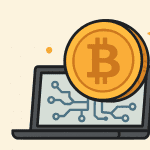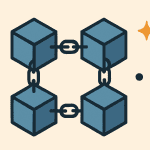Smart contracts are one of the most exciting features of blockchain technology. If you’re new to this topic, don’t worry—we’ll explain everything in simple terms.
Contents
What Is a Smart Contract?
A smart contract is a computer program that runs on a blockchain. It automatically executes actions when specific conditions are met. Think of it as a digital agreement that doesn’t need a lawyer or third party to enforce it.
For example, imagine buying a concert ticket online. A smart contract could automatically send the ticket to your email once payment is received. No one needs to manually check or approve the transaction. It all happens on its own.
How Do Smart Contracts Work?
Smart contracts are written in code and stored on a blockchain like Ethereum. Once deployed, they run exactly as programmed.
Here’s a simple step-by-step of how they work:
- Agreement in Code: The rules and actions of the agreement are written into a smart contract using a programming language like Solidity (used on Ethereum).
- Deploy to Blockchain: The contract is added to the blockchain, where it can’t be changed or deleted.
- Automatic Execution: When the conditions in the contract are met, it executes automatically. No human action is needed.
Key Features of Smart Contracts
- Trustless: You don’t need to trust another person—just trust the code.
- Secure: Once deployed, smart contracts can’t be changed.
- Transparent: Anyone can see the contract on the blockchain.
- Fast and Cheap: No middlemen, so actions are quicker and often cost less.
Benefits of Smart Contracts
- Automation: Smart contracts run automatically, reducing delays and errors.
- Cost Savings: Without intermediaries, you save on fees and commissions.
- Accuracy: Contracts follow exact instructions, reducing misunderstandings.
- Security: Blockchain’s encryption keeps contracts safe from tampering.
Real-World Examples of Smart Contracts
Finance: Smart contracts can manage loans, insurance, and trading. For example, DeFi platforms use them to lend money without banks.
Real Estate: Smart contracts can automate property sales. They ensure payment and ownership change happen at the same time.
Gaming: In blockchain games, smart contracts control in-game assets, rewards, and trading.
Healthcare: They help store and share patient data securely and with proper permissions.
Supply Chain: Smart contracts track products from factory to store, ensuring transparency and trust.
Are Smart Contracts Safe?
Smart contracts are secure, but they are only as good as the code they’re built on. Poor coding or bugs can lead to problems. That’s why it’s important to audit smart contracts and test them before use.
Limitations of Smart Contracts
- No Room for Flexibility: Once deployed, they can’t be changed easily.
- Coding Errors: Mistakes in the code can lead to loss of funds.
- Legal Questions: Not all legal systems recognize smart contracts as official agreements yet.
Conclusion
Smart contracts are powerful tools that can change how we make agreements and do business. They work on the blockchain, automatically doing what they are programmed to do. With benefits like speed, cost savings, and security, smart contracts have a lot of potential. However, users must be careful to ensure the contracts are well-written and secure.




